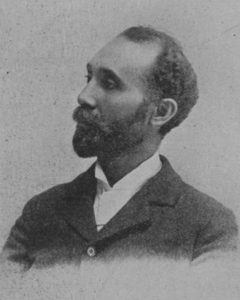
Ferdinand Barnett
*Ferdinand Barnett was born on this date in 1852. He was a Black journalist, lawyer, and civil rights activist.
Ferdinand Lee Barnett was born in Nashville, Tennessee. His mother was a freewoman, Martha Brooks. Ferdinand Lee Barnett's father was born in Nashville and worked as a blacksmith. He purchased his family's freedom the year Ferdinand was born. They lived in Nashville until about 1859, when they left the United States and moved to Windsor, Ontario, across the Detroit River from Detroit, Michigan.
They wanted to get beyond the reach of the Fugitive Slave Act of 1850, which had created incentives for slave catchers to kidnap free Blacks and sell them into slavery. The Barnett family returned to the US in 1869 after the American Civil War and the end of slavery, settling in Chicago, Illinois. Ferdinand was educated in Chicago schools, first attending the old Jones school at Clark and Harrison. He entered Central High School, graduating in 1874.
After high school, he taught in the South for two years before returning to Chicago to attend Union College of Law, now Northwestern Law School. Barnett graduated from law school and was admitted to the Illinois bar in 1878. In 1877, Barnett organized the semi-monthly newspaper The Conservator, a radical journal focused on justice and equal rights, and Barnett was soon recognized as a local Black leader.
Barnett's first wife, Mary Henrietta Graham, was the first black woman to graduate from the University of Michigan in 1876. The couple had two children, Ferdinand L. and Albert Graham Barnett. Mary died in 1890 of heart disease. The younger Ferdinand Barnett served as Eighth Regiment supply sergeant in World War I. Albert Barnett became the city editor of the Chicago Defender.
In June 1895, Barnett married Ida B. Wells. The couple had four children: Charles, Herman, Ida B., and Alfreda. Barnett's attraction to Wells included his recognition of the mutual support for each other's careers that the relationship would bring. Shortly before their marriage, Wells purchased Barnett's stake in the Conservator and became the paper's manager and co-editor, while Barnett focused on his legal career. Barnett was an active Republican, and his support for the party put him in line for public office.
In 1896, he was put in charge of the Bureau of Information and Education for Blacks by the Republican National Committee. Also, in 1896, Barnett became Illinois's first Black assistant state's attorney. As assistant state's attorney, Barnett worked in the juvenile court, in antitrust cases, frequently appeared before the Illinois Supreme Court, and had a good record. In 1902, Barnett made national news when he suggested that 10 million blacks would revolt against lynch law in the South at a gathering at Bethlehem Church in Chicago.
In 1904 he was appointed as head of the Chicago branch of the Republican Party's Negro Bureau. In 1906, Barnett was nominated as a judge in the new Municipal Court of Chicago, the first Black candidate for a judgeship in Illinois. Barnett lost the election by 304 votes due to a lack of support by white and Black Republicans. In the campaign for the position, Barnett did not gain the full support of Black ministers, particularly Archibald J. Cary. They were angry that his wife Ida B. Wells supported gambling kingpin Bob Motts's Pekin Theatre, which was converted from a saloon.
Barnett was initially declared the winner, but the results were reviewed, and Barnett became the only one of 27 Republican candidates rejected. If he had been elected, Barnett would have been the second Black judge in a court of record after Robert Heberton Terrell of Washington, D.C. Barnett left the position of assistant state's attorney in 1910, turning to private practice where he advocated for racial justice. He often worked pro bono, focusing on employment discrimination and criminal cases. In 1917, he was a candidate for alderman of the second ward in Chicago. In the 1920s, Barnett and his wife supported Marcus Garvey and the Universal Negro Improvement Association. In the 1920s and 1930s, Barnett began to support the Democratic Party. Ferdinand Barnett died on March 11, 1936.